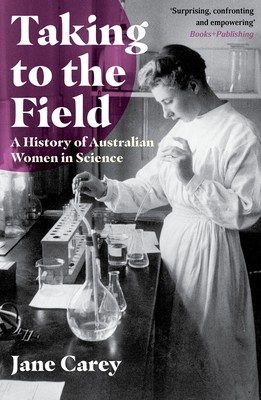
- We will send in 10–14 business days.
- Author: Jane Carey
- Publisher: Monash University Publishing
- ISBN-10: 1925835413
- ISBN-13: 9781925835410
- Format: 15.9 x 23.4 x 2 cm, minkšti viršeliai
- Language: English
- SAVE -10% with code: EXTRA
Reviews
Description
If asked to name an Australian woman scientist from the past, very few could. Let's change that. Histories of Australian science largely overlook women. Their absence gives the impression that, until recently, there were no Australian women scientists. But this is far from true: women formed a much larger proportion of the scientific community from the 1900s to the 1940s in Australia than in Britain or the United States, and numbers have only grown since. Why don't women scientists make it into history books? Because women's work is less cited than men's and more likely to be forgotten. Taking to the Field is the first comprehensive history of Australian women in science from the colonial period to contemporary times. This untold story shows that women have played a greater role than is commonly recognised. From the first years of colonisation, women engaged in myriad scientific endeavours, ranging from botany to genetics to organic chemistry. There was a vibrant culture of women in science in the years up to 1945 - as academics, researchers, lab workers, teachers, writers and activists for science-based social reform. They outnumbered men in some fields. This is not a straightforward tale of progress or a simple celebration of unsung heroines. Some women were involved in darker episodes of colonial science and eugenics. Few women of colour were given opportunities for scientific exploration. But within these limitations, many remarkable individuals illuminated our understanding of the world. From the first female science graduate, Edith Dornwell, to Nobel laureate molecular biologist Elizabeth Blackburn, Australian women have had an outsized influence. The botanical collection of Western Australian Georgina Molloy, the discoveries of Tasmanian-born molecular biologist Elizabeth Blackburn and the research of Melbourne zoologist Georgina Sweet all tell a story: how Australian women in science have transformed the world.
EXTRA 10 % discount with code: EXTRA
The promotion ends in 22d.04:18:36
The discount code is valid when purchasing from 10 €. Discounts do not stack.
- Author: Jane Carey
- Publisher: Monash University Publishing
- ISBN-10: 1925835413
- ISBN-13: 9781925835410
- Format: 15.9 x 23.4 x 2 cm, minkšti viršeliai
- Language: English English
If asked to name an Australian woman scientist from the past, very few could. Let's change that. Histories of Australian science largely overlook women. Their absence gives the impression that, until recently, there were no Australian women scientists. But this is far from true: women formed a much larger proportion of the scientific community from the 1900s to the 1940s in Australia than in Britain or the United States, and numbers have only grown since. Why don't women scientists make it into history books? Because women's work is less cited than men's and more likely to be forgotten. Taking to the Field is the first comprehensive history of Australian women in science from the colonial period to contemporary times. This untold story shows that women have played a greater role than is commonly recognised. From the first years of colonisation, women engaged in myriad scientific endeavours, ranging from botany to genetics to organic chemistry. There was a vibrant culture of women in science in the years up to 1945 - as academics, researchers, lab workers, teachers, writers and activists for science-based social reform. They outnumbered men in some fields. This is not a straightforward tale of progress or a simple celebration of unsung heroines. Some women were involved in darker episodes of colonial science and eugenics. Few women of colour were given opportunities for scientific exploration. But within these limitations, many remarkable individuals illuminated our understanding of the world. From the first female science graduate, Edith Dornwell, to Nobel laureate molecular biologist Elizabeth Blackburn, Australian women have had an outsized influence. The botanical collection of Western Australian Georgina Molloy, the discoveries of Tasmanian-born molecular biologist Elizabeth Blackburn and the research of Melbourne zoologist Georgina Sweet all tell a story: how Australian women in science have transformed the world.


Reviews